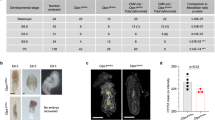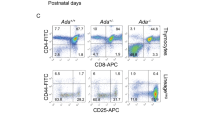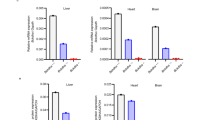Abstract
One of the current limitations of adenoviral gene therapy is a vector-induced humoral immune response that blocks effective re-administration of the vector. In an animal model of the inborn error of urea synthesis ornithine transcarbamylase (OTC) deficiency, the sparse fur (spf/y) mouse, we tested a strategy to transiently block the CD4 mediated immune response at the time of virus administration using an anti-CD4 monoclonal antibody (GK1.5). The co-administration of GK1.5 resulted in a significantly diminished production of neutralizing antibody to the adenovirus vector, but minimally prolonged metabolic correction. A second infusion of the same virus in GK1.5 treated spf/y mice led to a complete normalization of liver OTC activity at day 3 after infection and a significant metabolic correction of urinary orotate and plasma glutamine. In contrast, there was no evidence of enhanced OTC expression or metabolic correction (measured by normalization of plasma glutamine and urinary orotate) after the second infusion of virus in spf/y mice not treated with GK1.5. Furthermore, when co-administered with two consecutive doses of adenovirus, the anti-CD4 treatment allowed improved transgene expression upon a third administration of virus and a partial normalization of the metabolic abnormalities, compared with mice that did not receive anti-CD4 treatment. The level of OTC expression from the third viral infusion, however, was lower than that from the second viral infusion. Passive transfer experiments suggest that low levels of neutralizing antibodies developing over repeated viral administration was the likely cause of the reduced transgene expression. Together, these findings demonstrated that the host immune system can be modulated to permit effective transgene expression at therapeutic levels by re-administered adenoviral vectors.
This is a preview of subscription content, access via your institution
Access options
Subscribe to this journal
Receive 12 print issues and online access
$259.00 per year
only $21.58 per issue
Buy this article
- Purchase on Springer Link
- Instant access to full article PDF
Prices may be subject to local taxes which are calculated during checkout





Similar content being viewed by others
References
Wilson JM . Adenoviruses as gene-delivery vehicles New Engl J Med 1996 334: 1185–1187
Ali M, Lemoine N, Ring C . The use of DNA viruses as vectors for gene therapy Gene Therapy 1994 1: 367–384
Yang Y, Ertl HCJ, Wilson JM . MHC class I restricted cytotoxic T lymphocytes to viral antigens destroy hepatocytes in mice infected with E1-deleted recombinant adenoviruses Immunity 1994 1: 433–442
Tripathy SK, Goldwasser BH, Leiden JM . Immune responses to transgene-encoded proteins limit the stability of gene expression after injection of replication-defective adenovirus vectors Nature Med 1996 2: 545–550
Yang Y, Su Q, Wilson JM . Role of viral antigens in destructive cellular immune responses to adenovirus vector-transduced cells in mouse lungs J Virol 1996 70: 7209–7212
Yang Y, Li Q, Ertl HC, Wilson JM . Cellular and humoral immune responses to viral antigens create barriers to lung-directed gene therapy with recombinant adenoviruses J Virol 1995 69: 2004–2015
Michou A et al. Adenovirus-mediated gene transfer: influence of transgene, mouse strain and type of immune response on persistence of transgene expression Gene Therapy 1997 4: 473–482
Wohlfart C . Neutralization of adenoviruses: kinetics, stoichiometry, and mechanisms J Virol 1988 62: 2321–2328
Mack C et al. Circumvention of anti-adenovirus neutralizing immunity by administration of an adenoviral vector of an alternate serotype Hum Gene Ther 1997 8: 99–109
Dai Y et al. Cellular and humoral immune responses to adenoviral vectors containing factor IX gene: tolerization of factor IX and vector antigens allows for long-term expression Proc Natl Acad Sci USA 1995 92: 1401–1405
Jooss K, Yang Y, Wilson JM . Cyclophosphamide diminishes inflammation and prolongs transgene expression following delivery of adenoviral vectors to mouse liver and lung Hum Gene Ther 1996 7: 1555–1566
Guerette B et al. Prevention of immune reactions triggered by first-generation adenoviral vectors by monoclonal antibodies and CTLA4Ig Hum Gene Ther 1996 7: 1455–1463
Zsengeller Z et al. Anti-T cell receptor antibody prolongs transgene expression and reduces lung inflammation after adenovirus-mediated gene transfer Hum Gene Ther 1997 8: 935–941
Scaria A et al. Antibody to CD40 ligand inhibits both humoral and cellular immune responses to adenoviral vectors and facilitates repeated administration to mouse airway Gene Therapy 1997 4: 611–617
Yang Y, Greenough K, Wilson JM . Transient immune blockade prevents formation of neutralizing antibody to recombinant adenovirus and allows repeated gene transfer to mouse liver Gene Therapy 1996 3: 412–420
Kolls J et al. Use of transient CD4 lymphocyte depletion to prolong transgene expression of E1-deleted adenoviral vectors Hum Gene Ther 1996 7: 489–497
Yang Y, Trinchieri G, Wilson JM . Recombinant IL-12 prevents formation of blocking IgA antibodies to recombinant adenovirus and allows repeated gene therapy to mouse lung Nature Med 1995 1: 890–893
Brusilow S, Horwich A . Urea cycle enzymes. In: Scriver CR, Beaudet AL, Sly WL, Valle D The Metabolic and Molecular Bases of Inherited Disease McGraw-Hill: New York 1996 pp 1187–1232
Ye X et al. Prolonged metabolic correction in adult ornithine transcarbamylase-deficient mice with adenoviral vectors J Biol Chem 1996 271: 3639–3646
Acknowledgements
This work was supported by the NIH (NICHD P01-HD32649, NIDDK P30-DK47757–06) and Genovo, Inc, a company which Dr Wilson founded and holds equity in.
Author information
Authors and Affiliations
Rights and permissions
About this article
Cite this article
Ye, X., Robinson, M., Pabin, C. et al. Transient depletion of CD4 lymphocyte improves efficacy of repeated administration of recombinant adenovirus in the ornithine transcarbamylase deficient sparse fur mouse. Gene Ther 7, 1761–1767 (2000). https://doi.org/10.1038/sj.gt.3301299
Received:
Accepted:
Published:
Issue Date:
DOI: https://doi.org/10.1038/sj.gt.3301299
Keywords
This article is cited by
-
Delivery of Anti-IFNAR1 shRNA to Hepatic Cells Decreases IFNAR1 Gene Expression and Improves Adenoviral Transduction and Transgene Expression
Molecular Biotechnology (2022)
-
Readministration of helper-dependent adenoviral vectors to mouse airway mediated via transient immunosuppression
Gene Therapy (2011)
-
Identification of multiple genetic loci that regulate adenovirus gene therapy
Gene Therapy (2004)
-
Creation of immune ‘stealth’ genes for gene therapy through fusion with the Gly-Ala repeat of EBNA-1
Gene Therapy (2003)
-
Encapsulation of recombinant adenovirus into alginate microspheres circumvents vector-specific immune response
Gene Therapy (2002)



